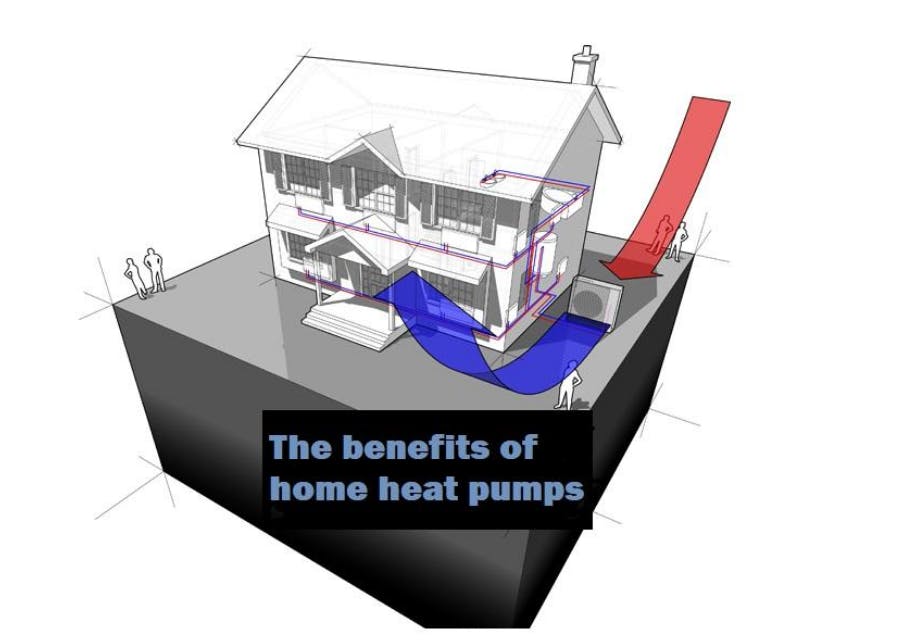Everyone should do their part to cut our carbon footprint and live more sustainably. One of the more common steps to take is to update a home’s heating and cooling system with an electric heat pump – a great way to reduce a household’s reliance on natural gas, oil or propane.
A heat pump is a bit of a misnomer because it helps to efficiently deliver both warm and cool air to the home. The device moves heat from the outdoors to the indoors, or vice versa, depending on the time of year. In cooling mode, a heat pump acts like an air conditioner, absorbing heat from the indoor air and releasing it through the outdoor unit.
Homeowners can determine how efficient a heat pump is by understanding how to read the efficiency ratings:
- Heating Seasonal Performance Factor (HSPF) is a heating efficiency rating for heat pumps. The higher the rating, the more efficient the heat pump. Look for a pump with an HSPF of 9 or higher.
- Seasonal Energy Efficiency Ratio (SEER) is the air conditioning and cooling efficiency rating for heat pumps and air conditioners. The higher the rating the more comfortable the occupants will be on the hottest days of the year. Look for a pump with a SEER of 16 or higher.
A more efficient heat pump will result in less energy use and increased savings over a lifetime compared to more traditional means of heating and cooling. To determine whether a home is working on an air conditioner or heat pump, turn up the heat on the thermostat. If heat comes out of the interior unit and the outside unit (metal box) is operating – the system is a heat pump.
The average cost to install a heat pump is $12,000 in the U.S. (before tax), with lower or smaller systems running as little as $4,000. Similar to natural gas heating systems costs, homeowners could spend up to $25,000 for the biggest and best system for a large home.
Experts estimate heat pumps can save around 40% on a home’s annual heating and cooling bills if switching from a heat source such as electric baseboards. Those switching from natural gas may not see much of a reduction in energy bills, due to the low cost of gas.
The need for backup home heating will depend on the climate of the region, the efficiency of the home and the recommendation of a heat-pump contractor.
Heat pump sizes are measured by the amount of air that they can move, and they are rated in tons. Most heat pumps range between 1.5- and 5-ton systems. Heating experts size a heat pump based on many factors – local climate, size of the home, energy efficiency of the structure, level of insulation and house envelope considerations.
A well-maintained pump can last 20 years or more and come with a manufacturer’s warranty of 10-15 years. Not all warranties are created equal and it’s wise to have some extra protection – either through the manufacturer or a home-warranty servicer – to cover maintenance and major repairs.
Like a furnace or air conditioner, heat pumps have air filters that need cleaning or replacement. Heat pumps can experience issues with inoperable thermostats or problems with the condensate pump.
There are three types of heat pumps:
Ducted air-source heat pump – These are often installed in new construction or when replacing an old furnace. A ducted system can deliver about twice the amount of heat energy to a home than the electrical energy it consumes. That’s because the pump moves warm or cool air rather than converting it from fuel.
Ductless mini-splits – A topic we covered before, these are perfect for retrofitting to a home or when putting in an extension to a house, particularly when installing ducting is less feasible.
Geothermal – A more expensive option, ground-source geothermal systems rely on the fairly consistent 50-degree (or so) temperatures below the earth’s surface – and not the variance of air temperatures – to pump air in or out of the home. These systems use a mixture of warmed water and antifreeze piped underground where the thermal energy is converted to warm air and pumped across a ductwork system. In summer, excess warm air is exhausted from the home into the ground.
Heat pumps are routinely being added to homes throughout our area. Any reputable HVAC service company can provide an in-home consultation and explain your options. And, remember to research incentives – from state or local governments or utility companies – toward purchasing a heat pump.
——
Rise, a leading online authority in sustainable home improvement, was a valuable resource for this blog post.





